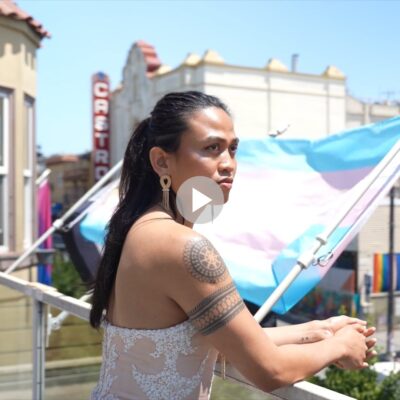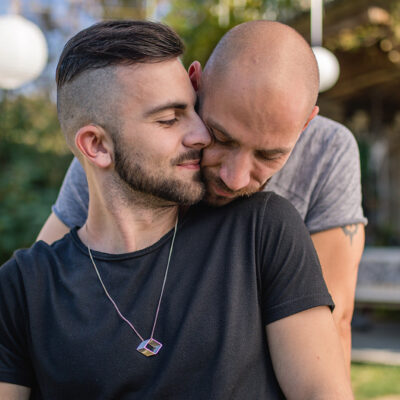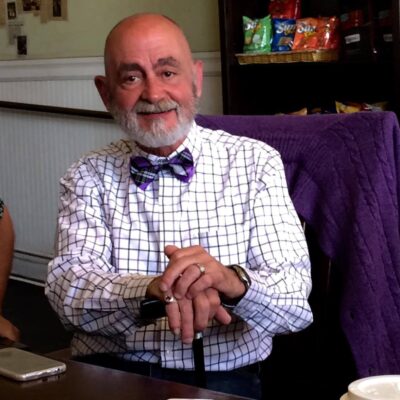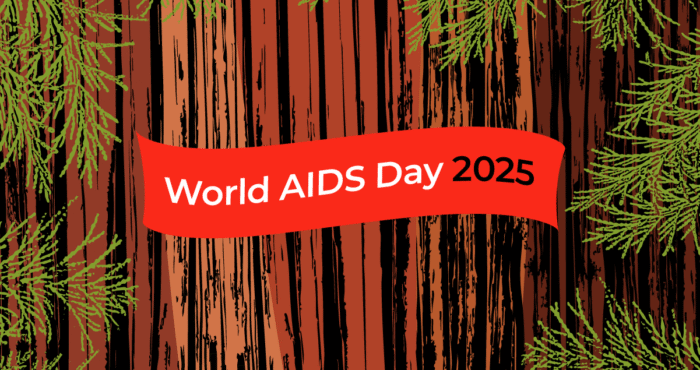Surviving Voices: Oral history of HIV lifetime & long-term survivors
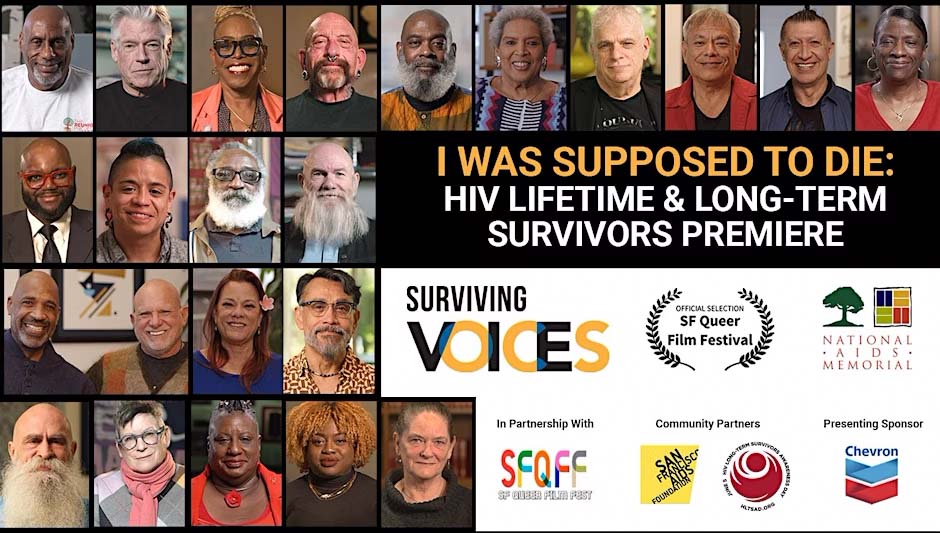
We went through this horrible experience that was full of fear and uncertainty and loss and grief year after year. And… that does something to a person.
– DK Haas, artist and long-term survivor
National HIV Long-Term Survivors Awareness Day (HTLSAD) is an annual event honoring those of us who survived the earliest days of the AIDS pandemic, raising awareness of the life-altering challenges of living for decades with HIV, and acknowledging the strength, resilience, and perseverance with which we have faced those unique challenges. Established in 2014 by Tez Anderson at Let’s Kick ASS–AIDS Survivor Syndrome, HTLSAD occurs on June 5 each year, commemorating the date in 1981 when the CDC issued its historic first official report of five cases of a strange, unknown illness affecting young gay men in Los Angeles, the recognized start of the ongoing AIDS pandemic.
In commemoration of HLTSAD this year, on Thursday, June 5, the National AIDS Memorial will premiere the 10th chapter of its multi-award-winning Surviving Voices AIDS oral history and documentary film series. Surviving Voices: HIV Lifetime & Long-Term Survivors will screen at San Francisco’s iconic Roxie Theatre in the Mission District. The 5:30 pm red-carpet premiere will feature a screening of not only the documentary, but also three of the documentary’s twenty-two full-length interviews.
Following the screening, there will be a panel discussion featuring some of the voices captured in the film: Tez Anderson, Derrick Mapp of the Shanti Project, Vince Crisostomo of San Francisco AIDS Foundation, and artist DK Haas, with Gregg Cassin of Honoring Our Experience moderating. Prior to the 5:30 pm Roxie Theatre premiere, there will be a reception at 4:30 pm for community members and lifetime and long-term survivors to gather, share stories, and again recommit to the work before us.
Over the last decade, the Surviving Voices oral history program has been repeatedly honored for its powerful work in helping tell the story of AIDS through the voices of survivors of the pandemic sharing personal stories of struggle, survival, resilience and perseverance. This year’s series, themed “Leading with Legacy,” captures the journeys of individuals living with HIV/AIDS in raw, honest, and forthright conversations. The filmed conversations highlight not only the vulnerabilities, shame, denial, stigma, and hopelessness they have experienced, but also tell of their individual strength, power, hope and resilience. They emphasize the importance of community, spirit, self-respect, and the will to live with dignity and pride. Produced and directed by filmmaker Jörg Fockele, the films capture survivors’ stories from across the nation, ensuring that the full breadth of individual and community perspectives is represented.
A few of those survivors whom Jörg interviewed agreed to answer some questions for me.
Gregg and Ruth Fordham, a married couple living in Norfolk, Virginia are both long-term survivors of HIV/AIDS. Ruth was diagnosed with HIV in 1988; Gregg was diagnosed in 1990; both progressed to AIDS, she fifteen years later, he in 1998. Both have worked for many years as advocates in their communities.
“We’ve been very open about our HIV status. Most times we’re accepted within our communities,” Ruth said, although both have experienced instances of stigma and shaming.
“We have both worked in the HIV field for years so here in tidewater we are known as those people who help if they can,” Gregg added.
Although both have been afflicted with HIV-related cancer, heart and kidney disease, thrush, and esophageal ulcers, they remain committed to teaching others about HIV and AIDS. Asked why they agreed to be interviewed, Ruth replied, “As a Christian living with HIV diagnoses for over 36 years, I feel as though we have a responsibility to share as much about our lives living with this disease as possible so that someone may learn from my choices.” Gregg concurred: “We want to feel like we helped someone or showed people how we did it, and maybe give somebody some hope.”
Jeff Taylor, known to many of us as the executive director of the HIV + Aging Research Project / Palm Springs, is sure he acquired the virus in Tokyo, 1981-82, when he was studying there. His status was confirmed in 1988 in Chicago. “The testing counselor told me I had two years to live and told me to ‘go home and start making arrangements.’ I had 200 T cells when diagnosed—though that wasn’t yet considered an AIDS diagnosis” because he had no accompanying opportunistic infection such as PCP or KS. In 1992, after the failure of a trial of aerosolized pentamidine, he was hospitalized with two collapsed lungs and only two T cells. In the years since, he has suffered HIV-related lipodystrophy, anal cancer, and other ailments.
In addition to his work for HARP-PS, he has served as Community Engagement Coordinator for the NIH-funded RID HIV (Reversing Immune Dysfunction in HIV) Collaboratory, and on advisory boards for the AIDS Clinical Trials Group, the UCSD AntiViral Research Center, and, until recently, the President’s Advisory Council on HIV/AIDS. He agreed to be interviewed for Surviving Voices “because now, more than ever, people need to know how we faced and overcame adversity. There are lots of parallels with the AIDS pandemic and what’s happening now, and the lessons learned could benefit everyone.”
John Cunningham, who has lived with HIV for 25 years, has served for 16 years as the CEO of the National AIDS Memorial and has been a community activist for 40 years. Regarding Surviving Voices, he told me, “It is profoundly important for lifetime and long-term survivors to give voice to their experience over the decades of the AIDS crisis. This segment of the population has so much to share of their own experience navigating this decades-long journey. The power of lived experience and the opportunity to bear witness to their courage is so critically important in these times.”
I asked John what role he sees for the National AIDS Memorial in these times when the federal government seems hell-bent on demonizing the LGBTQ+ and HIV communities.
He replied, “The National AIDS Memorial, through its two ‘pillar’ programs of the AIDS Memorial Quilt and the National AIDS Memorial Grove, today, as it has for nearly four decades, holds space for action and compassion. The Quilt has long stood as an activist tool to ensure that our government and society do not remain silent. The Grove holds the solemn responsibility as our nation’s only federally designated memorial to AIDS to honor all lives touched by AIDS and to comfort and support our community. Both the Quilt and the Grove provide hope through community while also providing space to gather and grieve. Today we again face forces that are focused on hate, stigma, and othering, and we as an organization feel it is our responsibility to use our history as a ‘touchstone’ and inspiration of individual and community action for good.”
“This is my life’s work,” he said, “and the greatest honor of my life.”
Chevron is a presenting sponsor of the film. Huma Abbasi, General Manager, Health & Medical at Chevron, said “Our long-time support for Surviving Voices is part of our commitment to sharing the very human experiences that have shaped more than 40 years of the AIDS epidemic.”
Thursday, June 5, 2025
Pre-Screening Reception: 4:30pm
Red Carpet Arrival & Photos: 5:30pm
Film Screening & Panel Discussion: 6:00pm-8:00p
The Roxie Theatre
3125 16th Street, San Francisco, CA 94103
Tickets are $12.51 and will benefit the National AIDS Memorial (cost includes processing fee).


